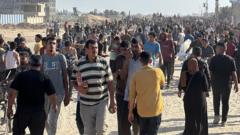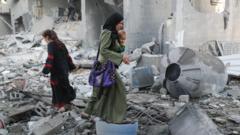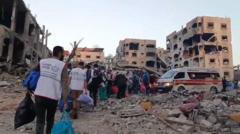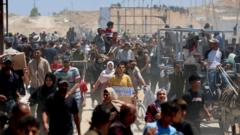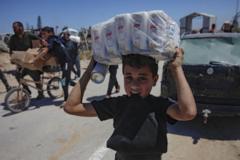The situation in Gaza has escalated with humanitarian officials calling for immediate international action and aid delivery.
**Gaza Facing Humanitarian Crisis, UN Officials Warn of Starvation Effects**

**Gaza Facing Humanitarian Crisis, UN Officials Warn of Starvation Effects**
The UN humanitarian chief asserts that forced starvation is taking place in Gaza as aid access is limited.
The UN's humanitarian chief, Tom Fletcher, has delivered a stark warning regarding the dire situation in Gaza during a BBC interview, stating that the people there are facing forced starvation due to ongoing Israeli military actions. This assertion has prompted questions about potential war crimes linked to such circumstances. Fletcher emphasized the need for immediate humanitarian access, which has been severely restricted since the overwhelming blockade initiated by Israel nearly three months ago.
Last week, Israel began allowing minimal aid into Gaza, though serious concerns remain about the flow and adequacy of necessary provisions like food, medicine, and fuel. Following the resumption of military offensives against Hamas, chaos erupted at aid distribution centers, with injured civilians reported as desperate crowds sought limited resources. Fletcher noted a troubling trend where aid sits at the borders, as Israeli policies seem to pressure the Gaza population.
He condemned remarks made by Israeli Finance Minister Bezalel Smotrich regarding the despair faced by Gazans, calling for Israeli Prime Minister Benjamin Netanyahu to refute such statements publicly. The increasing international scrutiny on Israel’s actions has drawn reactions from European leaders questioning the proportionality of military responses in Gaza.
Furthermore, Fletcher shared a previous controversial claim concerning potential loss of infant lives in Gaza, reiterating the necessity for precision in communication but remaining steadfast on the essential need to deliver aid. He also dismissed allegations that Hamas was hijacking aid provisions, firmly stating that humanitarian efforts must prioritize civilian needs above all.
The dire realities on the ground speak to broader systemic humanitarian challenges involving other global conflicts, with Fletcher highlighting the urgent call for the UN Security Council to take decisive actions against potential genocide. Despite criticisms faced from various quarters, he reaffirmed his commitment to advocating for aid and relief for those affected by the ongoing crisis.
As military operations continue in the region following a deadly Hamas attack on October 7, which claimed lives and resulted in hundreds taken hostage, the toll on civilians remains devastating, with reports estimating over 54,000 fatalities in Gaza alone since the conflict escalated. The full implications of this ongoing crisis underscore a critical need for global awareness and action in the face of impending humanitarian disasters.
Fletcher's insights and the need for a nuanced understanding of the evolving situation will be broadcast in a full interview on the BBC News Channel at designated GMT times.
Last week, Israel began allowing minimal aid into Gaza, though serious concerns remain about the flow and adequacy of necessary provisions like food, medicine, and fuel. Following the resumption of military offensives against Hamas, chaos erupted at aid distribution centers, with injured civilians reported as desperate crowds sought limited resources. Fletcher noted a troubling trend where aid sits at the borders, as Israeli policies seem to pressure the Gaza population.
He condemned remarks made by Israeli Finance Minister Bezalel Smotrich regarding the despair faced by Gazans, calling for Israeli Prime Minister Benjamin Netanyahu to refute such statements publicly. The increasing international scrutiny on Israel’s actions has drawn reactions from European leaders questioning the proportionality of military responses in Gaza.
Furthermore, Fletcher shared a previous controversial claim concerning potential loss of infant lives in Gaza, reiterating the necessity for precision in communication but remaining steadfast on the essential need to deliver aid. He also dismissed allegations that Hamas was hijacking aid provisions, firmly stating that humanitarian efforts must prioritize civilian needs above all.
The dire realities on the ground speak to broader systemic humanitarian challenges involving other global conflicts, with Fletcher highlighting the urgent call for the UN Security Council to take decisive actions against potential genocide. Despite criticisms faced from various quarters, he reaffirmed his commitment to advocating for aid and relief for those affected by the ongoing crisis.
As military operations continue in the region following a deadly Hamas attack on October 7, which claimed lives and resulted in hundreds taken hostage, the toll on civilians remains devastating, with reports estimating over 54,000 fatalities in Gaza alone since the conflict escalated. The full implications of this ongoing crisis underscore a critical need for global awareness and action in the face of impending humanitarian disasters.
Fletcher's insights and the need for a nuanced understanding of the evolving situation will be broadcast in a full interview on the BBC News Channel at designated GMT times.


